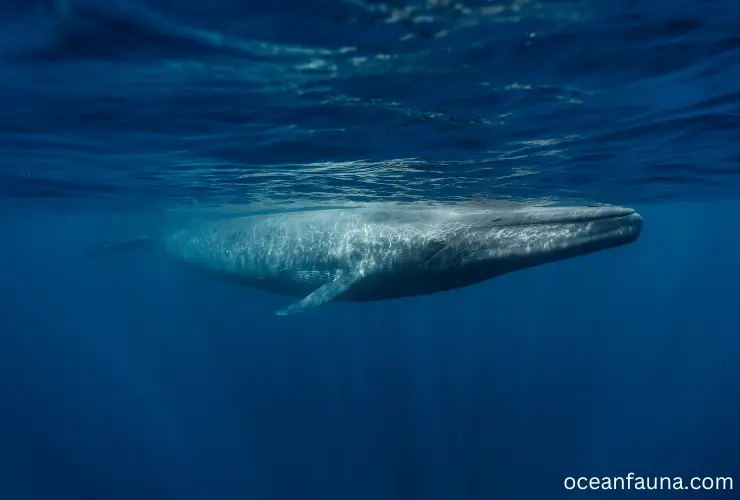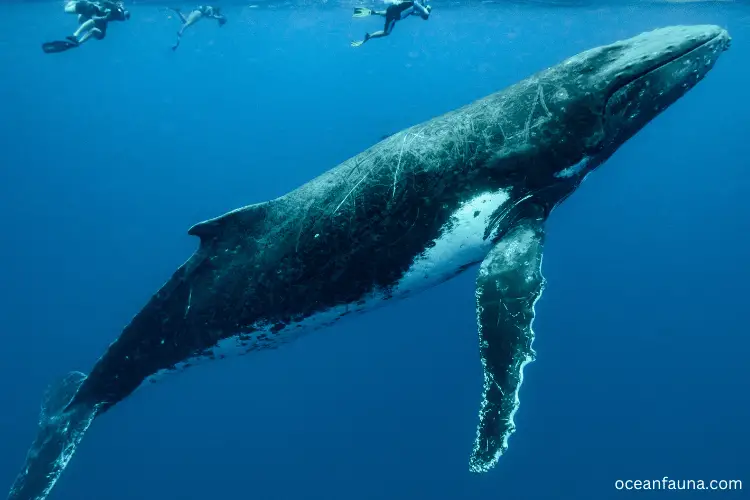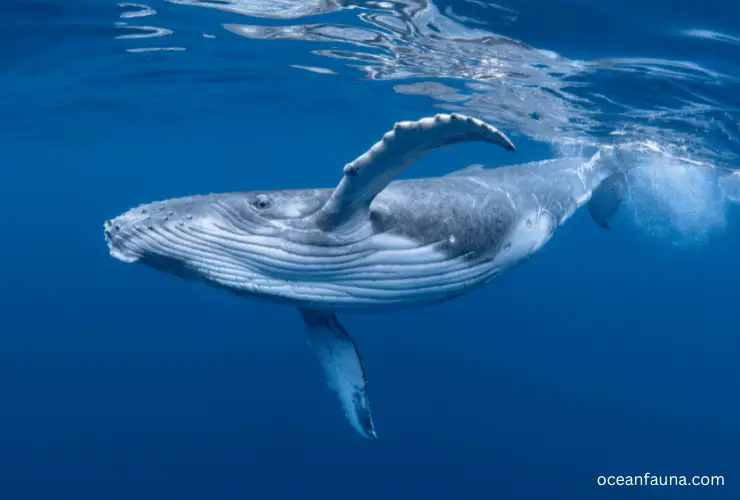Can whales live in freshwater? No. Whales are ocean dwellers, designed for saltwater life. However, some whale species can survive in estuaries.
But have you ever wondered why whales can’t live in freshwater? Of course, it’s their anatomical adaptation. Whales are adapted to live in the ocean’s salt water, and their bodies are not designed to function in freshwater environments.
However, in this blog, I will discuss in detail about this matter including their unique adaptations in the ocean. I will also explain some exceptional cases where a whale passes through freshwater. So keep reading and learn something new.
Can Whales Live in Freshwater?
Can whales survive in freshwater? The answer is, “No.”
Well, whales are fascinating creatures. They are known for their large size and intelligence and live in the ocean. These aquatic mammals are strictly adapted to saltwater and cannot survive in freshwater.
Their bodies are designed for life in the sea. They have thick, smooth skin to protect against salt’s corrosive effects. A layer of blubber insulates them from the cold. Also, whale kidneys produce urine with high salt concentrations. This helps them keep water in their bodies and avoid dehydration.
Whales eat small fish, krill, and plankton, which are not found in freshwater. This lack makes it hard for whales to survive there.
Plus, whales need a stable salt level in their environment for their bodies to work right. If the salt balance in their bodies is off, their metabolism, breathing, and immune systems can fail. This can cause health problems and even death.
Some whales may swim into freshwater rivers for a short time. But they quickly go back to the ocean. This shows that while they can visit freshwater, they cannot live there.
Why Can’t Whales Live in Freshwater?

There are several reasons why whales cannot live in freshwater. These include their body composition, physiological adaptations, and feeding habits. Here are the details:
Body Composition
Whales’ bodies are uniquely adapted to the marine environment. They have a thick blubber layer for temperature control in cold water. This blubber also helps with buoyancy and swimming. Their bodies are streamlined to swim long distances with less drag.
However, these adaptations do not suit freshwater environments. The blubber layer makes whales heavy. Their streamlined shape makes them slow in freshwater. Both traits hinder their ability to swim and navigate in it.
Physiological Adaptations
Whales have adaptations that help them thrive in the sea. A key adaptation is how they conserve water by excreting concentrated urine.
They also maintain a high salt level in their blood. These traits are vital in the salty marine environment. Freshwater lacks the salt needed for whales to regulate their water balance.
Feeding Habits
Whales are carnivores that eat fish and marine mammals. Freshwater does not offer the same variety of prey, so whales would struggle to find enough food.
Also, some freshwater fish have adaptations for survival that whales lack. Whales would need a different feeding strategy to survive in freshwater.
What Happens to Whales in Freshwater?
Whales are aquatic mammals adapted to saltwater. However, certain whale species sometimes enter freshwater. This can harm their health. Freshwater’s lower salinity and different pH and chemicals can cause whale health issues. These include skin problems and ulcers. Let’s explore the details.
Skin Problems
A whale’s skin has a thick, oily layer. This protects them and helps control their body temperature in saltwater. In freshwater, this layer can break down. This leads to skin issues like cracking and peeling. These problems can also cause infections, harming the whale’s health.
Ulcers
Whales in freshwater for too long may get ulcers. Freshwater chemicals can inflame and irritate a whale’s skin. This can lead to painful ulcers.
Disruption of Biological Processes:
Lower salinity and pH in freshwater can disrupt a whale’s metabolism and digestion. This may cause dehydration, poor nutrition, and constipation.
Changes in Behaviour
Whales in freshwater may act differently. For example, they may get upset, restless, or lose their way because of the new environment. These changes can make it hard for them to find food, socialize, and migrate, which can threaten their survival.
Is There Any Whale That Can Live in Freshwater?

No whale species can survive in freshwater forever. However, a few whale species do well in estuarine environments, where fresh and saltwater mix.
The Beluga whale is one species that thrives in estuarine habitats. These whales live in the Arctic and sub-Arctic. They find a variety of prey there. In summer, Belugas migrate up rivers like the St. Lawrence. They go there for abundant food like salmon and smelt.
According to a report, in 2006, a young female northern bottlenose whale was seen swimming in London’s River Thames. As per another research, a humpback whale was also spotted there during migration.
Other migratory whales sometimes enter freshwater briefly. However, they don’t stay there permanently. The Blue Whale and Humpback Whale, for example, may visit freshwater regions. But they rely on food found only in the ocean.
Therefore, these species cannot live in freshwater permanently. They are not considered freshwater whales.
FAQs
Are there whales in the Great Lakes?
No, there are no known whale species living in the Great Lakes. However, while migratory species such as the Blue Whale and Humpback Whale travel vast distances, they are not found in the Great Lakes.
Can whales survive in rivers?
Whales cannot live in rivers or other freshwater areas for long. They are physiologically adapted to the ocean, which makes freshwater survival difficult. Sometimes, certain whale species enter rivers during migration, but this is occasional.
Are there killer whales in freshwater?
People often think of orcas or killer whales as whales, but they are actually dolphins. Although this blog focuses on whether whales can survive in freshwater or not, it is worth noting that freshwater is not the main habitat for killer whales.
However, reports show that killer whales occasionally visit freshwater rivers like the Rhine, Thames, and Elbe. For example, one killer whale swam 177 km up the Columbia River to find fish.
Are there whales in the Great Salt Lakes?
We don’t have enough data to confirm if whales live in the Great Salt Lake. But there’s a legend about two Australian whales, a male and a female, brought to the lake in 1873. James Wickham reportedly moved them from San Francisco in rail cars designed for seawater.
Despite the story, scientists say the lake’s high salt levels and scarce food can’t support whales.
Where do whales live?
Depending on the species, whales live in all the world’s oceans. Some stay in shallow coastal waters, others in the deep open sea. Whales inhabit many marine environments, including the cold water of Arctic and Antarctic oceans, warm tropical waters, and mild temperate zones.
You can find some whales in seas like the North Sea and the Mediterranean. Many whales migrate long distances from their feeding to breeding grounds.
Conclusion
So, are there freshwater whales? The straight answer would be no; there is not. If you go through the whole blog, you must know why whales can’t live in freshwater. We’ve looked at how whales’ bodies and biology make freshwater unsuitable for them.
While a few whales might briefly visit estuaries, they generally cannot survive in freshwater. We must protect whales’ ocean homes to ensure their future.

